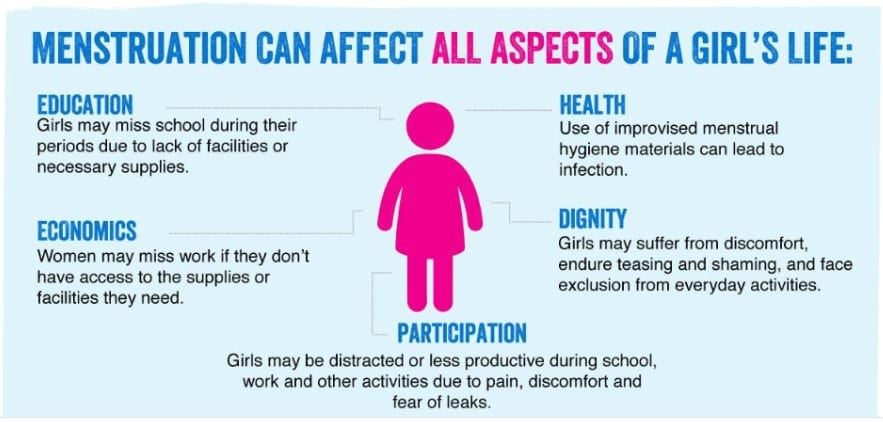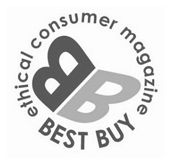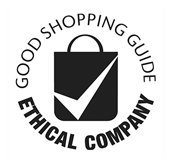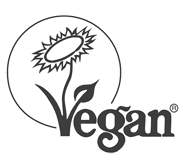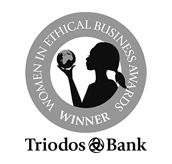What is World Menstrual Hygiene Day?
What is World Menstrual Hygiene Day? And what does the current global climate mean for menstrual hygiene?
World Menstrual Hygiene Day (MHD), spearheaded by Berlin-based non-profit WASH United, is held annually on 28th May. It is an awareness day created to highlight the need for menstrual hygiene rights for everyone worldwide.
Through social media campaigning, World Menstrual Hygiene Day aims to break the stigma around menstruation, provide access to menstrual health education, and create the opportunity for all to have access to what they need to effectively manage their periods.
What has the global pandemic meant for menstrual hygiene?
Before the Covid-19 pandemic, around 500 million women worldwide lacked adequate facilities for managing their periods. Unsurprisingly the global pandemic has made this worse.
In most countries, schools and other places where people can typically access critical information about menstruation closed. Free distribution of menstrual products in schools was sporadic and often suspended.
The economic impact of Covid-19 has forced many to prioritise other basic needs over safe menstrual products. Changing and disposing of period products safely and comfortably can be a further obstacle for those already struggling to access to water, sanitation and handwashing facilities.
The World Menstrual Hygiene Day campaign hashtag #ItsTimeForAction has, for the last three years, called for urgent action to address the ongoing global menstrual health and hygiene crisis post-pandemic.
As we enter a new global phase with new challenges, this year the focus is shifting from calling for action to leading by example and pushing for progress. Using the hashtag #WeAreCommitted, across the globe, organisations will be publicly declaring their commitments towards creating a world where no one is held back because they menstruate by 2030. Increasing transparency in this way fosters accountability and paves the way for others to follow suit.
Why is Menstrual Hygiene Management so important?
Access to menstrual products and safe, hygienic facilities in which to use them are essential for anyone who menstruates. We passionately believe that everyone should have the basic right to menstruate without shame or stigma.
However, for so many, this is not the case.
Poor menstrual hygiene management (MHM) can impact personal health and social well-being in several different ways. From being shunned from society to reside in illegal and dangerous menstruation huts in Nepal, to missing out on school, millions are being affected by issues to do with poor menstrual health.
The lack of menstrual products in poorer regions can lead to resourceful solutions from using rags to cow patties, old blankets or leaves (sometimes worn internally to stop the menstrual flow). Reports also suggest that it is not uncommon for girls in these regions to engage in transactional sex to obtain basic goods, including sanitary pads.
The health risks of these practices are clear, but there are other less obvious consequences that are linked with inadequate access to menstrual hygiene management. These include poor school attendance in the years following the start of menstruation, which can impact on education levels, widening the gender equality gap further.
Period Poverty in the UK
World Menstrual Hygiene Day is a day to both look at the problems happening worldwide, as well as closer to home.
A study, carried out by Plan International in 2017, found that in the United Kingdom ‘one in 10 girls between the ages of 14 and 21 were unable to afford sanitary products, while 49% missed an entire day of school because of their period.’ The research also revealed that nearly half (48%) of girls in the UK were embarrassed by their periods.
Following the report, the Free Periods campaign was started by British teenager Amika George. Its goal was to ensure that nobody misses school because of their period.
New research done by Plan International during the first Covid-19 lockdown found that 30% of 14-21-year-olds struggled to afford period products in the UK during the pandemic. Over half of them used toilet paper as an alternative.
The charity WaterAid conducted their own research and found that 54% of British women aged 18-55 also experienced increased challenges in managing their periods during lockdowns.
Free period products available in schools
The Scottish government was first to provide free products to learners in schools and colleges in 2018. Wales introduced funding for free products in schools from April 2019. The Scottish parliament has since passed a bill making free period products available to all.
In January 2020 a government funded period equality scheme was launched in England, meaning that state schools and colleges in England could now order free period products for students. Reusable products such as the Mooncup® are also available.
Years of austerity and the financial fallout from the pandemic is likely to push more women in the UK into poverty, including period poverty. However, in the countries sometimes described as the Global South, the problem is unfortunately likely to get even greater.
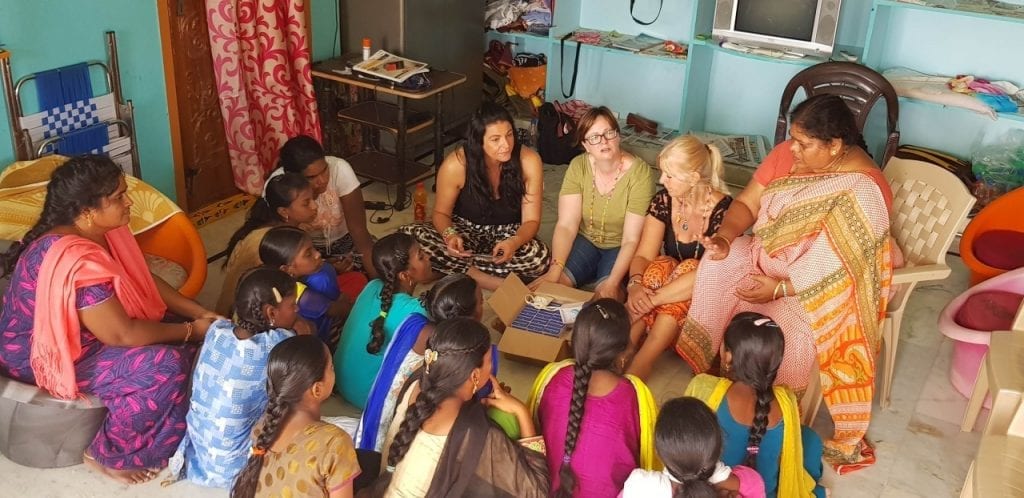
What are we doing to help on World Menstrual Hygiene Day?
At Mooncup Ltd we are proud to support menstrual health projects globally. We are working with many programmes, charities and not-for-profits both in the UK and globally. Some recent examples have included continuing to support girls’ education in Kenya and Sierra Leone through several charities.
Says Sara Goff from Lift the Lid:
“These reusable, safe, and sanitary menstrual cups mean the girls won’t miss school one week a month for a lack of expensive pads. These cups represent freedom.”
We are taking part in a pilot project with Adventure Aid distributing the Mooncup to girls in an orphanage in Southern India. We have also provided Mooncup menstrual cups to healthcare workers in Venezuela through the charity Healing Venezuela.
In the UK we continue to support City to Sea and their nationwide educational programme changing the way primary and secondary schools teach young people about periods. The programme trains teachers and school nurses to deliver unbiased lessons on periods and their environmental and social context.
To date, over 20,000 people with periods have received a free Mooncup menstrual cup through the charity and period equality projects we have participated in.
You can read more about the fantastic organisations we work with, and the positive impact we are committed to creating, here.
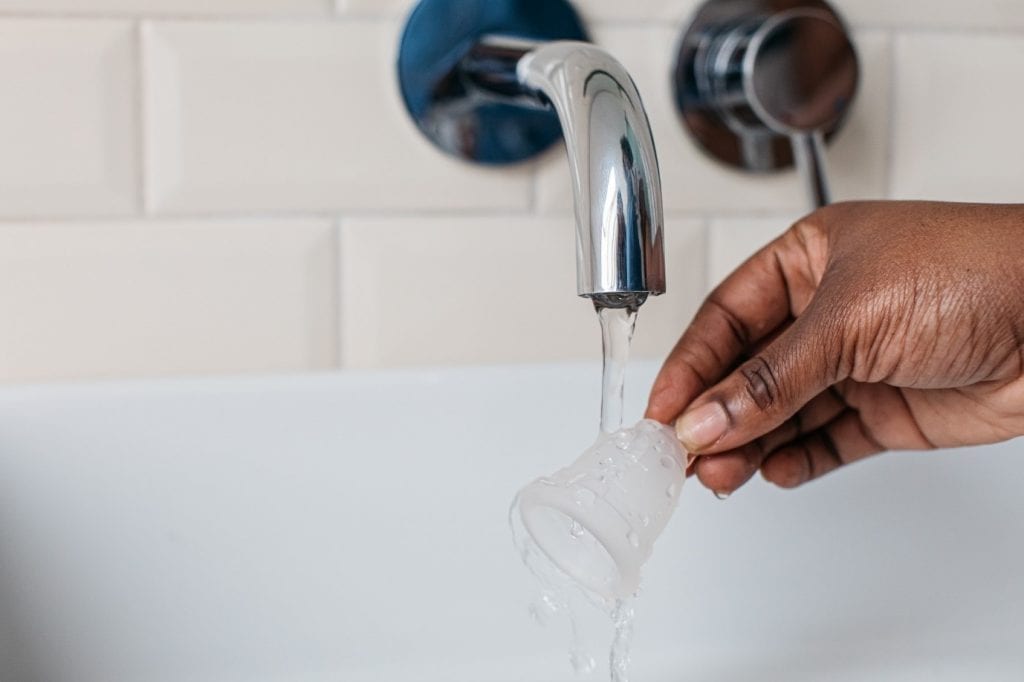
When is the Mooncup® menstrual cup an answer – and when is it not?
Mooncup supporters reached out to us keen to explore whether Mooncup Ltd would be able to offer some kind of help in the global crisis, as well as in the devasting situation in Ukraine. They know that, given the right set of circumstances, the Mooncup menstrual cup can offer a long term, sustainable solution. One that promotes independence and self-sufficiency and can genuinely break the cycle.
As an ethical business, it is important that we can be sure that the Mooncup is being introduced in an environment where it is genuinely wanted and helpful.
There are also practical points to consider, for example:
- access to clean water – for washing hands and cleaning the Mooncup.
- preference for internal or external products. Some people prefer to use external period products.
- sometimes other basic needs come first and trying something new is the last thing someone in a state of crisis might wish to do.
- whether culturally specific rites of passage may require an intact hymen.
- distribution infrastructures.
If the Mooncup® menstrual cup emerges as an appropriate solution, it is also important for the people using it to have access to good support and advice about usage.
At Mooncup Ltd, we have a dedicated team who work through the many charity applications we receive, establishing who we can best support and how.
How can you help?
Spread awareness
Use social media as a force for good to spread the word on this important cause.
Some good articles to read and share include:
- This blog post 🙂
- These image stats for social mediaTweet this article now!
- Spread the word about the period equality schemes.
- Action Aid: Periods and Girls’ Education
- Menstrual Hygiene Day by WASH
Donate to a menstrual hygiene cause
One of the best ways we can all help this Menstrual Hygiene Day is to raise awareness and/or make a donation to a charity which is working to help solve the problem.
Here are some of the charities you could support this World Menstrual Hygiene Day:
- WASH United
- Plan International
- UNHCR – the UN Refugee Agency
- ActionAid
- Bloody Good Period
- Days for Girls
You might also be interested in:
Reading more about the positive impact we are committed to creating
Did someone say free period?
Government backed scheme offers free access to period products including the Mooncup
Period Poverty in the UK: can the Mooncup help?
“Let’s Talk. Period.” Fighting period poverty through education with Brook
Woman on a mission to make period products free in Scotland

